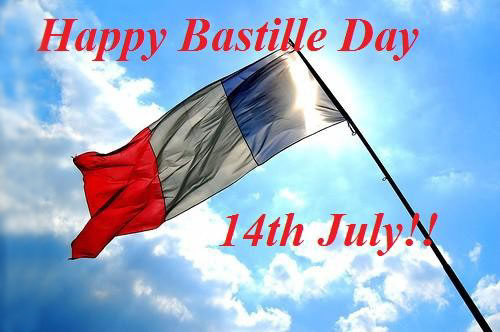We at Cle France are still working ergh! but... Happy Bastille Day to everyone!

What do people do on Bastille day?
Many people attend large-scale public celebrations. These often include:
Military and civilian parades.
Musical performances.
Communal meals.
Dances.
Balls.
Spectacular fireworks displays.
There is a large military parade in Paris in the morning of July 14. Service men and women from various units, including cadets from military schools, the French Navy and the French Foreign Legion, participate in the parade. The parade ends with the Paris Fire Brigade. Military aircraft fly over the parade route during the parade. The French president opens the parade and reviews the troops and thousands of people line the route. Other people spend the day quietly and eat a celebratory meal or picnic with family and close friends.
Some Helpful french phrases.
Cette semaine on fête le 14 juillet ou la fête nationale or Bastille Day as it’s known in English speaking countries. Le 14 juillet is something like la version française (the French version) of the fourth of July.
Pendant le 14 juillet there are a few big celebrations: le défilé militaire (the military parade) during the day and then at night les spectacle de feux d’artifice (the fireworks shows). However, cette semaine (this week) I learned something about les feux d’artifice that I didn’t know before.
Au 13 juillet, while at home I suddenly heard the loud bangs des feux d’artifice going off in the distance. I thought I’d missed le spectacle!
It turns out that les spectacles de feux d’artifice are spread out over a few days. Smaller towns have their spectacles earlier so that everyone is sure to come to the bigger cities during la fête nationale.
One other way to fêter (celebrate) is, bien sûr, to have a good time avec tes amis (with your friends). Just be careful, if you have too much fun you might wake up the next day with la gueule de bois (a hangover)!
Voici un petit vocabulaire de feux d’artifice :
Black snake - Pharaoh’s serpent le serpent du pharaon
Bottle - rocket la fusée
Firecracker - le pétard
Firework - le feu d’artifice
Fireworks show - le spectacle de feux d’artifice
Fountain - la fontaine
Roman candle - la chandelle romaine
Sparkler - le cierge magique
Public life
Bastille Day is a public holiday in France so post offices, banks, and many businesses are closed. Restaurants and cafes outside of tourist areas may also be closed. However, bakeries and some stores in Paris, as well as at airports and railway stations and along major highways, are open.
Public transport service schedules vary depending on where one lives and intends to travel. Roads in the centres of villages, towns and cities (particularly in Paris) may be closed for parades and other large public events.
Background
The Bastille is a medieval fortress and prison in Paris. Many people in France associated it with the harsh rule of the Bourbon monarchy in the late 1700s. On July 14, 1789, troops stormed the Bastille. This was a pivotal event at the beginning of the French Revolution. Fête de la Fédération was held on July 14, 1790. This was a way to celebrate the establishment of a constitutional monarchy in France.
Official celebrations were held in Paris on June 30, 1878, to honour the Republic of France. On July 14, 1879, more official celebrations were held. These included a military review in Longchamp near Paris and celebrations all over the country. A politician named Benjamin Raspail proposed that July 14 should become a holiday in France in 1880. The law was enacted on July 6, 1880. Bastille Day was a public holiday for the first time on July 14, 1880.
The military parade in Paris has been held every year since 1880, except during World War II. The Free French Forces paraded on this date in London, England from 1940 until 1944. Jean Michel Jarre held a concert in Paris that attracted one million people, then the largest recorded crowd at an outdoor concert, in 1979. Special celebrations were held for the 200th anniversary of the French revolution in 1989. The French football team became world champions on July 12, 1998. This sparked celebrations throughout France on Bastille Day.
Bastille Day celebrations are held in French communities and the Institut de France around the world. Such events in the United States are held in Milwaukee, Minneapolis, New York City, Philadelphia, San Francisco and Seattle. There are festivals of French culture in Franschhoek, South Africa, and Hungary.
Symbols
The Eiffel Tower in Paris and the French national flag, or tricolour, are important symbols of Bastille Day. The French national flag is one-and-a-half times as wide as it is tall. It consists of three vertical bands of equal width coloured blue, white and red. The same colours are displayed in bunting and banners of many shapes on Bastille Day. People may also wear clothing or face paint in these colours.

Blog submitted by: Alex at The French Property Network - Cle France.